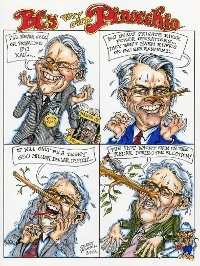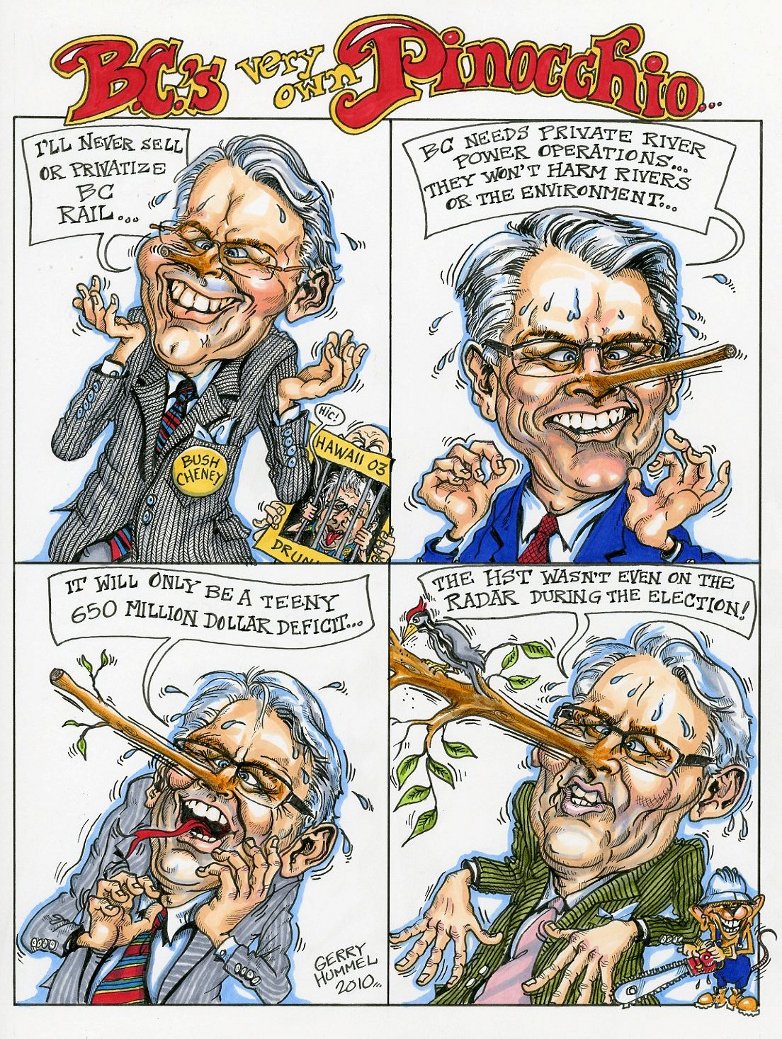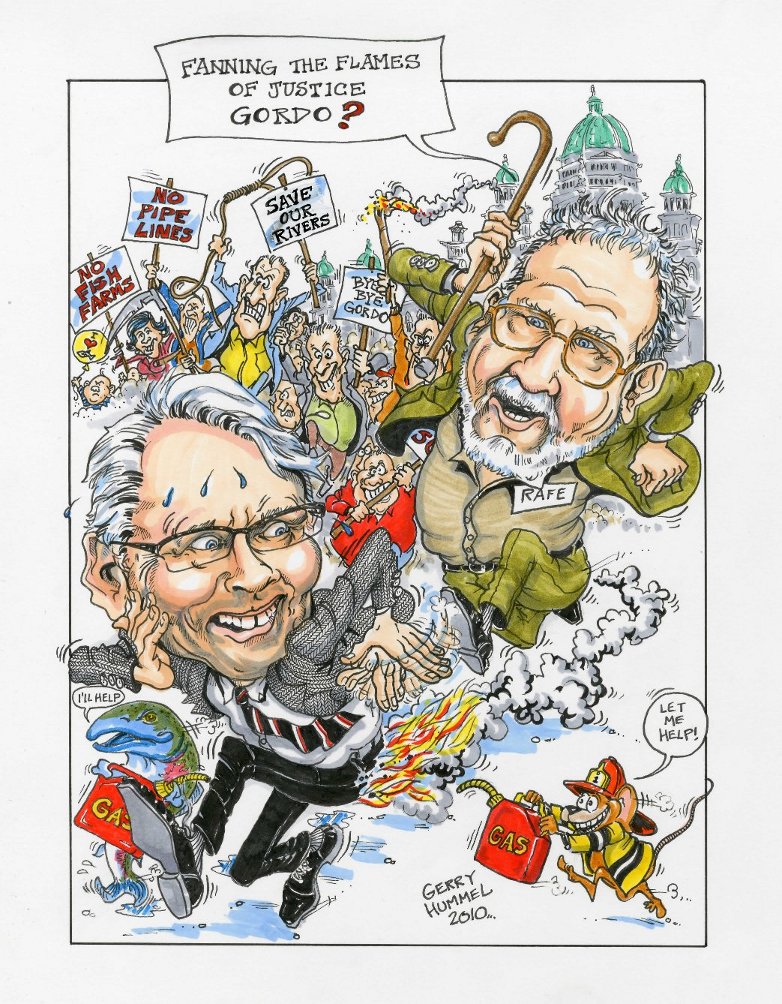The chickens are coming home to roost for Premier Gordon (Pinocchio) Campbell. The question is how do we best handle the political consequences.
I spent a lot of time with Carole James during the election a year ago last May and came to like her and admire her in spite of the fact she, or rather the NDP, ran a terrible campaign. I told her partway through the campaign that it looked to me as if someone had a death wish for her.
The result wasn’t really her second loss, although it was that if one proceeds simply numerically. It’s not fair to pin the previous loss on Ms. James because she did bring the party back from the grave’s edge. The election in 2013 is hers to win or lose.
I’ve been hard on Ms. James for her present tactics of staying off the battlefield and mingling with the crowd. In fairness, that may have as much to do with my own combativeness as any other factor. I was weaned in the politics of hand-to-hand combat with lots of blood being spilt. Maybe we have to wait and see whether Ms. James and her advisers are right. In fact, she may be right – for a special reason I’ll talk about it a moment.
No one can be something they’re not. When I went into radio in 1981, the great Jack Webster had two bits of advice: if you’re interviewing your mother, have a piece of paper with Mom written on, for you’ll be amazed at whose name you can forget under pressure; and be yourself, don’t try to ape any other broadcasters including me.
Ms. James simply would not be herself if she were to enter pitched battles and try to win by noise and figurative bloodshed what you should win by reason.
Here’s the special reason Ms. James may be on the right track. For the first time I can remember, the “environment” is a big issue – indeed it’s huge. And there isn’t a nook or a cranny where this government and especially this leader are not in high odour on this issue.
In the past, governments have always been able to play off one group against another but this isn’t going to be so easy in 2013. I’ll guarantee that there will be much more unity of action by environmentalists. It will scarcely be any kind of coalition because such are simply not possible. By their very nature, many groups are concentrated on one issue or one geographical area or both. There are conflicts for available money. All have different histories. This does not mean that they cannot get together for a political purpose.
What will become, to the surprise of many no doubt, a serious matter for Campbell is the coming together for the purposes of defeating him – groups that have been and perhaps still are on separate issues in separate areas. To save this province from the wanton destruction by this government is a common goal and will bring, I believe, a much closer-knit political response.
If I’m right about the high profile of the environment and if there can be a common cause of defeating Campbell, Carole James must convince British Columbians of two things: that she cares for the environment, and that as premier she will do something about it; and she must convince people that she won’t make a balls-up of the economy.
These two factors support the notion that the NDP leader should travel the province convincing people that she will reverse the environmental policies of the Campbell gang and that she will be a safe pair of hands to run the province.
My own philosophy in the 2009 election as repeated to audiences around the country was pragmatic – I simply said that while I didn’t believe they will, if the NDP screw up the economy a later government can fix it; what a later government cannot do is bring back the destroyed rivers, the ruined salmon runs, and BC Hydro. They can be no more restored into their old form than scrambled eggs can ever go back into their shells.
But Carole James cannot win on that sort of fatalism – she must convince the public that the NDP can be trusted to do a better job than the Liberals can which is a pretty low bar indeed as I’m sure you will agree. She must convince groups around the province that she is capable and those groups must include all sections of society.
To follow such a course will take guts especially if she will be up against Carole Taylor or Dianne Watts. Of course Ms. Taylor brings her own baggage: she didn’t resign in protest as she should have and is thus responsible for much of the destructive policy of this government, and so far as I know hasn’t issued forth a peep about the Energy Policy and Fish Farms policy of the government, and, frankly, I would be surprised if knows anything about these issues. Having heard nothing to the contrary I assume she supports this government’s insane and destructive Gateway project and Deltaport enhancement.
Diane Watts is a very popular mayor of Surrey but that’s a hell of a long way from the premier’s chair in Victoria. In fact I would be surprised if Ms. Watts changed her declared position that she’s not interested.
I remain principally concerned about the environment and especially rivers and fish. I haven’t cast a fly line since 2005 so it’s not my hobby I’m fighting for but the very soul of this province, our trademark: our rivers and our salmon.
In saying that I respect and will always support other environmentalists who have their own important priorities. As John Donne said over 300 years ago and is as true today as then, “No man is an island entire of itself; every man is a piece of the continent, a part of the main”. When you ponder the truth of that powerful message it becomes clear that we must all see the bigger picture. I know that pipelines destroy fish and rivers, as tanker accidents do. We know that this government’s insane highway development destroys valuable farmland and habitat and that Burns Bog is sacred as are the Pink salmon runs in the Broughton Archipelago. As we know that the blot of destruction spreads everywhere, all of us must fight that destruction where we’re best able to do so and help others wherever they may be.
And that’s the key to success – fight our damndest in areas where we have prioritized and help others do the same as we gather together in the political arena to support those who share our values, which are no more than to save and protect our province for the sake of those who come after us.








